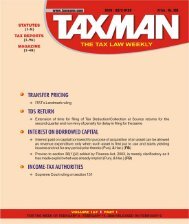CPT V24P7-Art1 (Content).pmd - Taxmann
CPT V24P7-Art1 (Content).pmd - Taxmann
CPT V24P7-Art1 (Content).pmd - Taxmann
You also want an ePaper? Increase the reach of your titles
YUMPU automatically turns print PDFs into web optimized ePapers that Google loves.
The High Court held in favour of assessee -<br />
It was held that it is place of first receipt of<br />
income which is material for purposes of<br />
determining place of accrual under section<br />
5(1)(i). Therefore, place of receipt of an income<br />
is place where it is received by assessee in its<br />
character of income; mere transfer of said amount<br />
thereafter from one bank account to another<br />
bank account cannot be considered as receipt<br />
of income, because one cannot receive income<br />
from himself. Therefore, income arising to<br />
assessee from sale of property in the UK could<br />
not be brought to tax in India.<br />
No Section 11 exemption if trust invests<br />
funds to buy shares of founder’s associated<br />
company<br />
In ITO v. KAS Foundation [2012] 23<br />
taxmann.com 292 (Chennai - Trib.), main object<br />
of assessee-trust was micro-financing of rural<br />
people. Assessee borrowed ` 20 lakhs on interest<br />
from a bank and invested same in a private<br />
company ‘J’. Assessee was paying interest on<br />
money borrowed but received no benefit from<br />
company ‘J’. Assessee’s investment in company<br />
‘J’ was found to be approximately 10 per cent<br />
of subscribed and paid-up share capital of ‘J’.<br />
Further, founders of assessee-trust had substantial<br />
interest in company ‘J’. On noticing it, the AO<br />
held that assessee had violated provisions of<br />
sections 13(1)(d)(iii) and 13(2)(h) and, therefore,<br />
was not eligible for exemption under sections<br />
11 and 12.<br />
The Tribunal held in favour of revenue - It<br />
held that as per the facts of the case assessee<br />
borrowed money and instead of financing in<br />
rural areas he invested the same in the company<br />
‘J,’ where the founders of the assessee-trust<br />
were having substantial interest, which was<br />
contrary to the object of which the registration<br />
was granted to the assessee under section 12AA.<br />
Apart from the above, the assessee was paying<br />
interest on money borrowed without receiving<br />
any benefit from ‘J’. It was evident that contrary<br />
to its objects assessee invested the borrowed<br />
}<br />
funds in private company ‘J,’ where the founders<br />
had a substantial interest. Therefore, the assessee<br />
had violated the provisions of section 13(1)(d)(iii).<br />
The AO was correct in holding that assessee<br />
was not eligible for exemption under sections<br />
11 and 12.<br />
Supply of news by agencies to a newspaper<br />
co. is ‘professional service’ and invites<br />
section 194J and not section 194C<br />
In Asstt. CIT v. Ushodaya Enterprises (P.)<br />
Ltd. [2012] 23 taxmann.com 258 (Hyderabad<br />
- Trib.), assessee-company was engaged in<br />
publishing of newspapers. It made payments<br />
to various news service agencies and deducted<br />
TDS under section 194C from said payments.<br />
During assessment the AO held that those<br />
payments would fall under section 194J and<br />
not under section 194C. Consequently, he raised<br />
demand to extent of difference of tax liable<br />
to be deducted under section 194J and that<br />
under section 194C. On appeal, the CIT(A)<br />
upheld the order passed by the AO.<br />
The Tribunal held in favour of revenue - It was<br />
held that work carried out by newspaper agents<br />
required professional qualifications and skills<br />
and, therefore, TDS had to be deducted from<br />
aforesaid payments under section 194J and<br />
not under section 194C. Therefore, payments<br />
made by newspaper company to news agencies<br />
were liable for deduction of tax at source under<br />
section 194J. In the result, the Tribunal upheld<br />
the demand.<br />
Income from transfer of shares by a<br />
promoter along with ‘not to compete’<br />
agreement with the transferee is taxable<br />
as business income<br />
In Sumeet Taneja v. Addll. CIT [2012] 23<br />
taxmann.com 403 (Chd. - Trib.), assessee was<br />
a promoter/MD of a company ‘E’, which carried<br />
on business of running a call centre. Assessee<br />
had sold all his shares to another company ‘P’<br />
August 1 to 15, 2012 u TAXMANN’S CORPORATE PROFESSIONALS TODAY u Vol. 24 u 73<br />
}<br />
}<br />
693











![“FORM NO. 3CEB [See rule 10E] Report from an ... - Taxmann](https://img.yumpu.com/45480232/1/190x245/form-no-3ceb-see-rule-10e-report-from-an-taxmann.jpg?quality=85)





